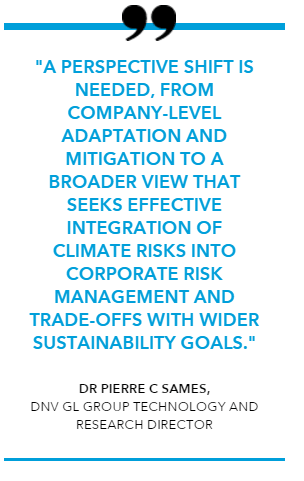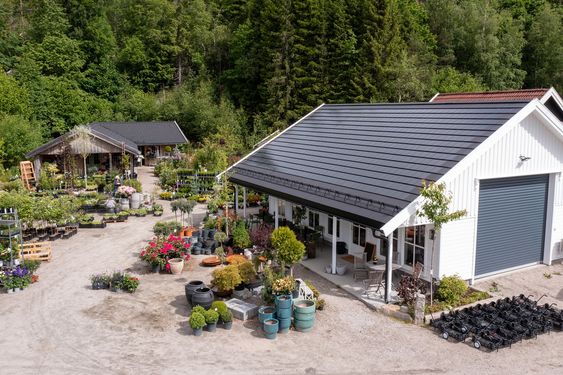In January 2017, DNV GL’s Climate Action research programme issued a position paper titled: Business action for climate-resilient pathways: the role of standards.
Businesses already rely upon management and corporate governance systems to cope with the rapidly changing, interconnected and globalized business context. DNV GL suggests that these systems must now be deployed to deal with the greatest change driver of them all: the uncertainty, complexity and systemic nature of climate impacts. This encompasses both physical and non-physical risks, including policy and legal, technology, market and reputation risks – all of which have the potential for substantive financial impacts.
New standards are undoubtedly required to help business, and society, cope with the scale of the coming challenge. Procedural standards could, for example, guide companies on how to identify and manage multiple climate risks, and on how to integrate this work into existing risk management processes.
However, as Dr Pierre C Sames, DNV GL Group Technology and Research Director, notes, a perspective shift is needed from company-level adaptation and mitigation to a broader view that seeks co-benefits and trade-offs with wider sustainability goals.
DNV GL’s online features team interviewed the paper’s lead author, Asun St Clair, Senior Principal Scientist in DNV GL’s Climate Action Programme:
There is a lot of uncertainty associated with the effects of climate change – surely this calls for flexibility rather than standards-based approaches?
Yes there is uncertainty as the impacts of climate change are variable over time and specific locations but there is substantive agreement in that climate change poses serious risks for business continuity and for the societies in which business operates. This is analogous to many other risks companies face, such as economic downturns or societal conflict. Companies are used to adapting to a changing world and to conditions of uncertainty. Climate change is not different. We need both standards, flexibility and agility to envision and adapt to change.
Why is DNV GL taking the lead on exploring the role of standards in mobilizing business climate action; what qualifies the company to do so?
We think that the effort to develop standards to support business climate action should come from business itself. DNV GL has 150 years’ experience in developing standards to support our customers with managing risk, and we are positioned as a neutral party between companies, governments and civil society. We work together with our customers to find solutions to their most complex challenges, and create partnerships for action across different actors.
How would adaptation standards relate to other systems of governance, for example that promoted by Future Earth?
Future Earth is the foremost international research platform providing knowledge and support to accelerate transformations to a sustainable world; but it is very aware that knowledge is generated in partnership with society and the users of science. Future Earth includes the most well-known scientific perspectives on climate governance, but it does not engage on private governance, which is led by industries and formal standards organizations. Adaptation standards will have to be science-based, but industry led. This requires close partnerships between industry and sustainability science networks like Future Earth.
What aspects of adaptation are most in need of standards?
To me, the most important thing is to better understand what constitutes successful adaptation. What processes are required for successful business adaptation to climate change? What is for example a climate resilient organization? We need to generate methods and processes that enable comparability and efficiency and that result in consensus on the types of evidence organizations need in order to demonstrate they have taken all the reasonable steps to be well-adapted. To date, no one has answers to these questions.
What are the next steps?
The next step for us is to drive close coordination between multiple stakeholders including business, scientists and governments. DNV GL already provides climate services to our customers, including support with assessing climate risks and opportunities. We are now looking to work with our customers to generate guidance and standards to help business establish climate-resilient development pathways – ensuring synergies between climate change mitigation and adaptation, commercial success, and efforts to respond to the Sustainable Development Goals (SDGs).
CUSTOMER INSIGHT
“Our customers tell us that they need specific and practical guidance and standards to bridge the divide between these global ambitions like The Paris Agreement and the SDGs and the reality of their local operations and markets. In addition, investors also need credible and standardized data on companies’ climate risk-related liabilities and opportunities. Achieving a consensus will be a challenge to which DNV GL can take a leadership role.”
– Jon Woodhead
Regional Assessment Services Manager
DNV GL – Business Assurance







2 Comments
Pingback: Deck Building in Austin
Pingback: Garage Door Repair in Mesa